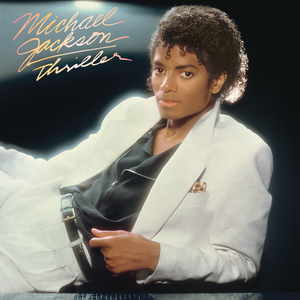
Michael Jackson – Thriller
When Pop Music Reached Its Final Form
Let’s address the elephant in the room: discussing Michael Jackson’s music in the modern era feels like trying to appreciate a da Vinci while the museum’s on fire. But we’re here to talk about “Thriller” – the 1982 album that didn’t just move the goalposts for pop music, it strapped rockets to them and launched them into orbit.
Here’s the thing about “Thriller”: it’s so ubiquitous, so woven into our cultural fabric, that it’s almost impossible to hear it with fresh ears. It’s like trying to objectively evaluate oxygen. But let’s try anyway, shall we?
The album opens with “Wanna Be Startin’ Somethin'” – a track that builds like a pressure cooker of funk until it explodes into that “mama-se, mama-sa, ma-ma-coo-sa” chant that would later spawn a thousand samples. It’s Jackson and Quincy Jones showing their homework (the chant borrowed from Manu Dibango) while simultaneously graduating with honors.
Then there’s “Billie Jean” – good lord, “Billie Jean.” That bass line should be in a museum, preferably with armed guards protecting it. It’s the kind of groove that makes atheists believe in intelligent design. The paranoid lyrics, the rhythmic breathing, the way the strings creep in like suspicion – it’s a perfect pop record. Not good, not great: perfect.
“Beat It” somehow made rock and R&B kiss and like it. Eddie Van Halen’s guitar solo drops into the song like an alien spacecraft landing in the middle of a block party, and somehow it works. It’s the kind of cross-genre pollination that shouldn’t work on paper but ends up creating a new primary color.
The title track is basically its own Halloween franchise at this point, but strip away the zombie makeup and Vincent Price monologue, and you’ve still got a masterpiece of tension and release. The way it builds, layer by layer, is like watching a master chef construct the world’s most dangerous cake.
“Human Nature” is so smooth it makes silk feel like sandpaper. It’s the kind of ballad that makes you forget ballads became uncool. Those synthesizers float like clouds on a summer day, while Jackson’s vocals remind us why he could make even the most cynical critic believe in magic.
Production-wise, this album is basically Quincy Jones showing off. The mix is cleaner than an operating room, but it still manages to feel warm and alive. Every instrument has its place, every effect has its purpose, every finger snap is exactly where it needs to be. It’s like the audio equivalent of a perfectly solved Rubik’s cube.
Let’s talk numbers, because they’re ridiculous: seven singles out of nine tracks. Seven. That’s not an album, that’s a greatest hits compilation in disguise. The fact that “The Lady in My Life” wasn’t a single tells you everything you need to know about this album’s depth.
Rating: 10/10 – Some albums are timeless. This one owns time.
Essential Tracks: All of them. Yes, even “The Lady in My Life.”
Side Note: If this album were a meal, it would be a Michelin-starred chef making the best burger you’ve ever had, then garnishing it with gold leaf and serving it on the moon.
Production MVP: Quincy Jones, proving that sometimes the real genius is knowing how to frame genius.
Historical Context: In 1982, MTV was still figuring out whether they wanted to play black artists. After “Thriller,” they didn’t have a choice. This album didn’t just break racial barriers – it moonwalked through them.
Look, separating art from artist is a personal choice, and everyone’s got to draw their own lines. But “Thriller” as an album is like the Great Pyramid of Giza – regardless of how you feel about who built it or how it came to be, you can’t deny its perfect engineering, its cultural impact, or its enduring influence on everything that came after.
In the end, “Thriller” isn’t just an album that sold a lot of copies (though oh boy, did it ever). It’s proof that pop music can be both commercially successful and artistically brilliant. It’s that rare moment when the most popular thing is also the best thing. Whether that’s enough to overcome its creator’s legacy is up to you, but the album itself? It’s literally as good as pop music gets.
If this album were a meal, it would be a Michelin-starred chef making the best burger you’ve ever had, then garnishing it with gold leaf and serving it on the moon.
Perfect! 🙂
What a great review. So much good music on this album. I appreciated all your thoughts and information.
I remember being wowed the first time I heard Thriller on the radio. I even know where I was (like the moon landing). I was glued to the radio for days, dropping what I was doing to listen when the song came on. When I finally saw the video, I was blown away. I had never heard or seen anything like Thriller.
This was a little like walking down memory lane. Thanks!